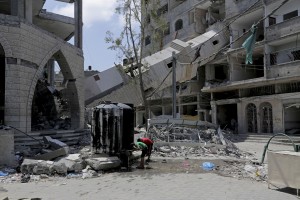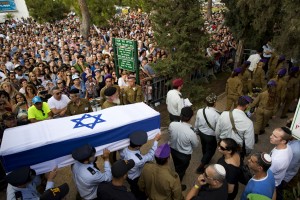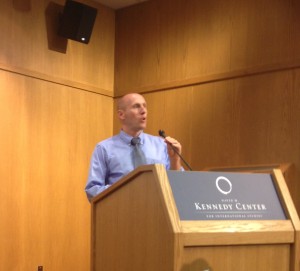Professors at the Kennedy Center took on the challenge of explaining the “perplexities of the nations” on the heels of the most recent outbreak of the Israeli-Palestinian conflict.
The Sept. 10 panel was titled, “Making Sense of the Crisis in Gaza” and included Professors James Toronto, Joshua Gubler and L. Quinn Mecham. All three experts have lived in the Middle East and currently teach BYU courses on the region.

The seeds of conflict
“The common misconception is that it started with Abraham,” Gubler said. In reality, he claimed, the Israeli-Palestinian conflict began with the Holocaust, which was the culmination of centuries of Jews being mistreated by both people and governments in Europe.
“Jews decided the only way to avoid this again was to have a state of their own,” Gubler said. “A state that was dominated by Jews, where the government was Jewish and the military was Jewish.”
Neither is the conflict a matter of Jews and Arabs per se, but rather of Israeli Jews versus Palestinian Arabs.
“You can still find Jews and Arabs living in Israel who remember the good old days of drinking tea together,” Gubler said.
The creation of this state involved the displacement of thousands of Palestinians. Many of these Palestinians are now angry over the loss of their homes, land and power. This anger has contributed to the creation of Hamas, a terrorist group that currently governs in Gaza, and the conflict has since escalated with multiple wars and thousands dead on both sides.
Gubler said that one of the most controversial elements of this summer’s conflict is the Israeli blockade on goods, including items such as toothpaste, to Gaza. Israel maintains the blockade for legitimate security reasons, but it has led to a lower standard of living in Gaza.

Recent events
The most recent war, which Israel titled Operation Protective Edge, is currently in a ceasefire, but Hamas, which was losing power before the war began last summer, emerged from it with renewed popularity in Gaza.
“Seventy-nine percent of Palestinians believe that Hamas won the war,” Mecham said. “Leaders of Hamas have a 78 percent approval rating of how they conducted the war.”
Mecham explained that while a look at the numbers would show a clear victory for Israel, (2,104 Palestinians died compared with 72 Israelis) Hamas has taken advantage of the media and won the battle of public opinion the world over, much to Israel’s surprise.
“If I was an Israeli adviser, and I was asked how to ensure that more than a million people are really, really made at me because of deep psychological trauma, I would have advised them to do what they did in Gaza,” Mecham said.
Gubler agreed with Mecham, saying that while he loves Israel, it is continuously walking into a trap. “Hamas has a plan,” he explained. “Come and destroy a lot of people, you’ll look really bad, and we will look really good as a result.”
Gubler referred to a Hamas strategy of launching more than 4,700 rockets at Israel from highly populated civilian areas. Israel’s military response results in civilian casualties and free press for Hamas.

A solution
Mecham did not express optimism for an immediate solution, but he offered insight into what he believes needs to happen before peace can come to the region. He said the first step is for the Palestinian Authority, a less extreme group that represents Palestinians in the West Bank, to start working with Hamas.
“Life in Gaza has got to get better,” he said. “If Palestinians can see a road to a peaceful life that does not involve militancy, I believe they will take it.” He also acknowledged that Israel would not lift the blockade until it felt more secure.
In his concluding remarks, Toronto encouraged students to follow the counsel in Doctrine and Covenants 88, which teaches people to “teach diligently … the wars and perplexities of nations.”
“The Church does not take sides in this conflict, affirming that Heavenly Father loves all his children, both Arabs and Jews,” Toronto said.




